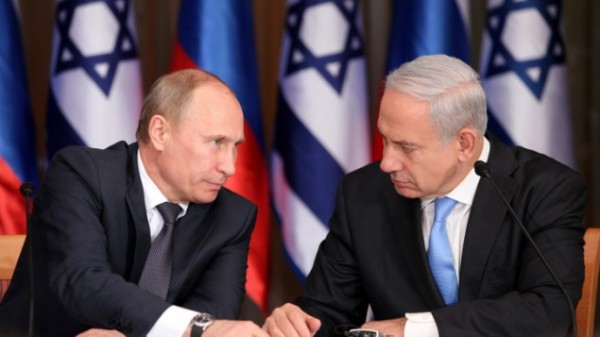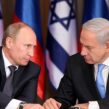
Israeli PM Netanyahu in Moscow to Strengthen Ties with Russia
Publication: Eurasia Daily Monitor Volume: 10 Issue: 210
By:

In an apparent last-ditch attempt to stop the so-called interim agreement to solve the Iranian nuclear problem that is being prepared in Geneva by the group of six nations—the United States, France, Germany, the United Kingdom, Russia and China—Israel’s Prime Minister Benjamin Netanyahu came to Moscow this week to seek President Vladimir Putin’s help. The interim agreement could unfreeze billions of dollars of Iranian accounts in foreign banks and, in addition, ease severe international trade sanctions that have been crippling the Iranian economy and potentially undermining the ruling theocracy. In exchange, Iran is expected to grant more access to United Nations inspectors and voluntarily limit the scope of its nuclear program while negotiations continue with the six to find a permanent solution for the Iranian nuclear issue. Netanyahu has been a staunch critic of the proposed interim agreement, which he has described as a bad deal that could take Iran off the hook of sanctions while it continues to build the potential to produce a nuclear weapon in the future. At the Kremlin, while making a press statement together with Putin, Netanyahu reiterated the Israeli stand on fully dismantling the Iranian bomb-making potential: “Uranium enrichment must stop, the enrichment centrifuges must be dismantled, the enriched uranium must be moved out of the country and the [newly built heavy-water] reactor in Arak must be taken apart” (https://news.kremlin.ru/transcripts/19662).
As the Russian media predicted, Putin did not agree with Netanyahu on Iran: Moscow has been promoting a “compromise agreement” that would give Tehran sanctions relief in exchange for a partial freezing of its nuclear program. Moscow hopes to reestablish large-scale arms sales to Tehran along with nuclear cooperation, including building nuclear power reactors after sanctions are removed. The removal of sanctions would legalize such trade and provide the Iranian government with more free cash to pay for Russian military and nuclear goods. On the Syrian civil war, Moscow and Tehran are allies, financially, militarily and diplomatically supporting the regime of President Bashar al-Assad. Iran desperately needs the partial unfreezing of its hard currency reserves trapped in foreign banks to continue to finance the al-Assad war effort and pay foreign volunteers from Lebanon (Hezbollah) and Iraq, who are fighting in Syria. A victory by the pro-al-Assad forces in Syria would be seen in Moscow as a personal triumph for Putin, who managed to keep in power a friendly regime against all odds and in spite of an insurgency inspired by Western and Salafi Jihadist forces. While disagreeing on how to deal with the Iranian nuclear issue, on Syria the Russians and Israelis are closer: A takeover in Damascus by an unruly coalition of opposition and Jihadist forces is clearly seen as a threat by both (https://www.ng.ru/world/2013-11-21/7_netaniahu.html).
Both Putin and Netanyahu were optimistic about developing relations in different fields of technical cooperation, trade and regional security. Putin was in a joyful mood during the televised part of the encounter and spoke about the prospect of a speedy solution at the talks in Geneva on Iran and the planned conference in Geneva on Syria. Netanyahu talked about the historical cultural ties between Russians and Jews and praised Putin for promoting an agreement to fully destroy the Syrian chemical arsenal (https://news.kremlin.ru/transcripts/19662). While Netanyahu was meeting Russian government officials and local Jewish community leaders, in Israel, Foreign Minister Avigdor Lieberman—a Soviet-born Israeli politician recently reinstated in government after being acquitted by an Israeli court of charges of fraud and breach of trust—made a statement immediately noticed in Moscow. Lieberman argued that Israel must seek new international partners to replace the faltering US. According to the Israeli foreign minister, “ties between Israel and the US are weakening” because of the Barack Obama administration’s position on the Iranian nuclear question and other issues. The US, overwhelmed by multiple challenges worldwide and by economic woes at home, can no longer be a leading power everywhere (https://www.interfax.ru/print.asp?sec=1446&id=342290). Russian experts believe the US is in the process of strategic withdrawal from the Middle East and is abandoning its allies in the region (https://www.itar-tass.com/opinions/1890).
Last week, Russian Defense Minister Sergei Shoigu and Foreign Minister Sergei Lavrov visited Cairo and were given a red carpet welcome by senior Egyptian officials, who are seeking Russian help in developing nuclear power and possible multi-billion-dollar arms shipments. The present Egyptian regime turned to Russia after US aid was partially withheld by the Obama administration as punishment for a military coup last July that overthrew the first freely-elected Egyptian president, Islamist Mohamed Mursi, after mass protests against his rule (https://en.ria.ru/world/20131114/184716097/Russia-Egypt-Vow-to-Boost-Military-Ties.html).
Reportedly, Russia may sell Egypt $2–4 billion worth of jet fighters, anti-aircraft and anti-tank missiles. The funds are supposed to come from Saudi Arabia and other rich Gulf Arab countries, which are disgusted by the Obama administration’s flirtations with Tehran and Washington’s failure to punish the al-Assad regime for its use of chemical weapons (https://www.kommersant.ru/doc/2340302).
It is difficult to imagine that Netanyahu could have reasonably hoped for a U-turn in Russian policy on Iran after just one visit. At present, it is Paris that is keeping a tough line within the six-country group, pressing for more Iranian concessions. But clearly it is important for Israel to invest in better relations and understanding with Russia in the future—while US power, political will and resolve to pursue a consistent policy of any kind in the greater Middle East continue to wane. Moscow’s decision making is heavily influenced by Soviet-style, anti-Israeli-inclined military, intelligence, diplomatic and arms-trading officials. But there is also an active pro-Israeli lobby in town and in the Kremlin; and Putin likes to balance his Middle Eastern policies while listening to both groups.
Israel could also be an important source of advanced military technology to help rearm the obsolete Russian military. The only operational unmanned aerial vehicles (UAV) or drones in the Russian arsenal today are Israeli-made, or the Forpost UAVs built in Russia under Israeli license, using foreign components (https://www.arms-expo.ru/049057054050124051048049053053.html). Israel could possibly provide more know-how in exchange for Putin taking Jewish interests into account, while playing strategic decision-maker in the larger Middle East.
Putin seems to be visibly pleased to be taking over from the US and reestablishing Russian influence in regions where, during the Cold War, the Soviet Union was dominant. Of course, the present-day Russian Federation is smaller and weaker than the Union of Soviet Socialist Republics (USSR) and can hardly hope to step into Soviet boots in the Middle East. Rather, it is almost exclusively US weakness and Washington’s lack of strategic direction that has today created an opportunity for a Russian foreign policy renaissance.




